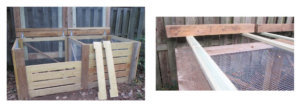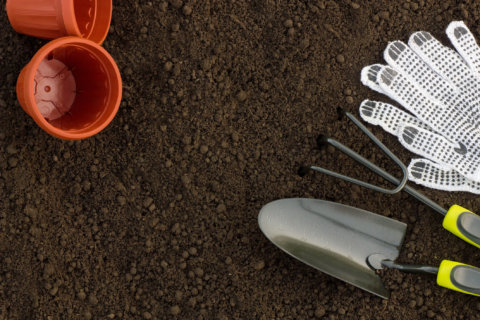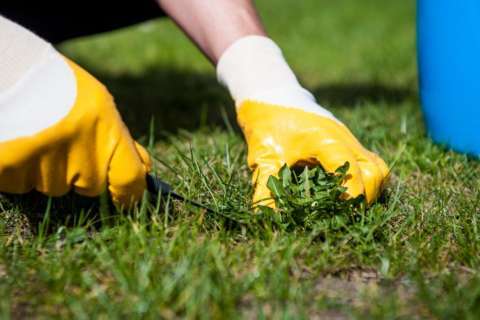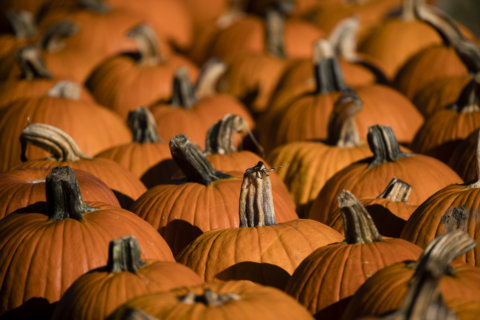Steel cage compost challenge!
Mark in Waldorf writes: “On Nov. 2, you told us, ‘Do not include food scraps, wood ash, grass clippings, junk mail or other nonsense in your compost pile. I’ll explain why next week.’ You didn’t. I agree about junk mail and wood ash. And, I agree that grass clippings should always be left on the lawn. But what’s wrong with food scraps?”
Busted! Mark is correct that I forgot to follow up. Thanks for the feedback, Mark!
Anyway, the “wrong” about food scraps in ordinary outdoor compost piles is that:
- They can — and will — attract rats, mice and raccoons.
- They add surprisingly little nutrition to the finished compost.
- Any acceptable scraps can only make up a small percentage of a pile; the bulk must be shredded leaves, or you’ll have a compost bin full of garbage.
No, no, no and no
Wood ash is tremendously alkaline — almost as much as agricultural lime — and can stop composting cold. Use the abundant ashes from a wood stove to make acidic soil more neutral (if and when necessary — and, it is often necessary in our area).
Grass clippings from a treated lawn will produce plant-killing compost; and clippings from a nonchemical lawn should always be left behind to feed the lawn.
And, junk mail? Give me a break! There’s zero nutrition in that bleached and treated paper — and, it’s easy to recycle such junk into new paper, like the kind of paper on a roll that you panic about when you see there isn’t any. (“Can I get change for a five?!”)
Mark likes everything!

Mark in Waldorf writes: “I throw everything into my compost bins: melon rinds and orange rinds, banana peels, apple cores, carrot tops, etc. Also chicken bones, steak fat and shrimp skins. Don’t tell me they won’t biodegrade; they do. And, my compost bins are rat, squirrel and raccoon-proof (I’ve added spring latches on both sides of the fronts).”
Mark sent pictures of his bins and they are indeed rodent-proof — so, some of his kitchen garbage is safe to include. But, citrus peels contain corrosive compounds that kill worms and other soil life, and bones take forever to decompose.
Big exception: Those shrimp shells. All seafood shells contain chitin — an excellent source of calcium and other really interesting nutrients that fight plant diseases.
But, obviously, such items must be in a totally vermin-proof pile.

I want first-time composters to succeed
Mark in Waldorf is challenging my advice to make compost only from shredded fall leaves and spent coffee grounds. And, he has every right: As his photos show, he has constructed supercool (and very attractive) vermin-proof bins. He writes: “I compost everything; and it all breaks down.”
Hey — I break down, Mark, and that doesn’t mean it’s good for my plants! Just because things such as apple cores and lettuce leaves break down doesn’t mean they make good compost. They are pretty much nutrient-free.
Same for stuff such as shredded paper (no nutrition) and wood ash (way too alkaline). Perhaps, more importantly, my weekend shots of advice are geared to impart the knowledge to accomplish success in 50 seconds — and, you’ll always make great compost by shredding up all your fall leaves and mixing in the nitrogen-rich spent grounds from a local coffee shop.
After you can do that perfectly, yes — move on up to your Ph.D. level.
Take Composting 101, then get your black-gold Ph.D.
Mark in Waldorf — who built some of the most perfect compost bins I have ever seen — is challenging my advice to make compost only from shredded fall leaves and spent coffee grounds.
My response?
- Ordinary kitchen waste has very little nutrition. It should go into a worm bin where the exact same garbage will make super-powerful compost.
- Junk mail and office paper offer zero nutrition, and they are easily recycled as paper.
- Wood ash is highly alkaline. Use it instead of lime to raise the pH of a lawn.
Bottom line: My goal here is to get as many listeners as possible to shred and use their fall leaves. Spent coffee grounds are the single best addition. Everything else introduces the risk of compost failure, and I want first-timers to achieve compost success.
So shred those leaves! (And, hire Mark to build your bins.)
Mike McGrath was editor-in-chief of ORGANIC GARDENING magazine from 1990 through 1997. He has been the host of the nationally syndicated public radio show “You Bet Your Garden” since 1998 and WTOP Garden Editor since 1999. Send him your garden or pest control questions at MikeMcG@PTD.net.







